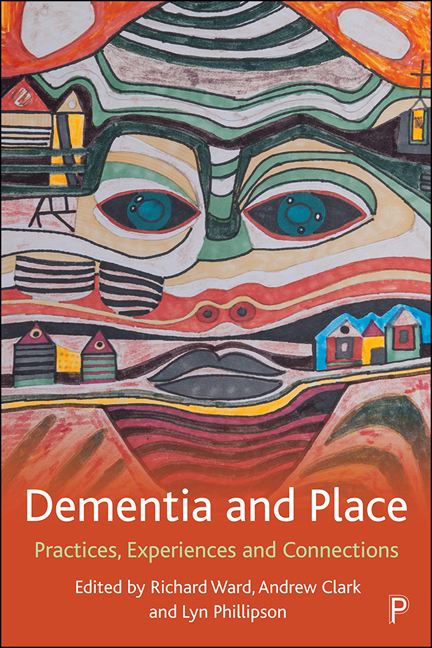Book contents
- Frontmatter
- Dedication
- Contents
- List of figures and tables
- Notes on contributors
- Acknowledgements
- 1 Introduction: Placing dementia
- 2 Understanding the meaning of neighbourhoods for people living with dementia: the value of a relational lens
- 3 Moving house with dementia
- 4 How do people with dementia manage problematic situations in public spaces?
- 5 Making and maintaining neighbourhood connections when living alone with dementia
- 6 My neighbourhood, my future ...?
- 7 Enabling the neighbourhood: a case for rethinking dementia-friendly communities
- 8 A conceptual framework of the person– environment interaction in the neighbourhood among persons living with dementia: a focus on out-of-home mobility
- 9 We’re known as ‘the girls’ around town: support, isolation and belonging for a lesbian couple living with dementia
- 10 Building community capacity for dementia in Canada: new directions in new places
- 11 The good, the challenging and the supportive: mapping life with dementia in the community
- 12 Growing back into community: changes through life with dementia
- 13 Dementia, tourism and leisure: making the visitor economy dementia friendly
- 14 Conclusion: Dementia emplaced
- Index
12 - Growing back into community: changes through life with dementia
Published online by Cambridge University Press: 13 May 2022
- Frontmatter
- Dedication
- Contents
- List of figures and tables
- Notes on contributors
- Acknowledgements
- 1 Introduction: Placing dementia
- 2 Understanding the meaning of neighbourhoods for people living with dementia: the value of a relational lens
- 3 Moving house with dementia
- 4 How do people with dementia manage problematic situations in public spaces?
- 5 Making and maintaining neighbourhood connections when living alone with dementia
- 6 My neighbourhood, my future ...?
- 7 Enabling the neighbourhood: a case for rethinking dementia-friendly communities
- 8 A conceptual framework of the person– environment interaction in the neighbourhood among persons living with dementia: a focus on out-of-home mobility
- 9 We’re known as ‘the girls’ around town: support, isolation and belonging for a lesbian couple living with dementia
- 10 Building community capacity for dementia in Canada: new directions in new places
- 11 The good, the challenging and the supportive: mapping life with dementia in the community
- 12 Growing back into community: changes through life with dementia
- 13 Dementia, tourism and leisure: making the visitor economy dementia friendly
- 14 Conclusion: Dementia emplaced
- Index
Summary
Prior to my diagnosis my involvement in community was centred around my extended family and work and work colleagues. Like many people, my family is spread over a large geographic area and meaningful interaction involves physical and social contact. This has necessitated regular travel by private car. Private transport provides a needed degree of flexibility and control that is lacking from public transport. Social interaction within my local community was limited to a small circle of friends who were predominately work colleagues.
Then came my diagnosis. In mid-2013 at the age of 59 I was diagnosed with younger onset dementia. As part of my diagnosis I was given three to six years to live and told that I should retire as soon as possible. I soon began to experience the stigmas associated with dementia that are often the result of people's misconceived stereotypes around dementia. My GP also advised me not to tell anyone I has frontotemporal dementia, but to say that I had frontotemporal degeneration. I didn't understand why she would advise this, but later realised it was a strategy to avoid the stigmas associated with dementia. I was also advised I either had to stop driving or have a driving test. However, it was both expensive and stressful to undergo a ‘fitness to drive’ assessment, just to prove I could still drive. So it felt like there were obstacles being put in the way of me continuing to do the things that were important to me. As I finished work my world of social interactions diminished and my interactions with the broader community contracted. What I experienced I later realised was best described as ‘prescribed disengagement’ (Swaffer, 2015), being advised to withdraw from ‘normal’ life, get my affairs in order and prepare to die. My broad group of social contacts contracted to a few friends and family. My interactions within my local neighbourhood became those oriented around doing ‘essential tasks’ such as grocery shopping and medical appointments – a model that could have been the prototype of ‘social isolation’ in today's world of COVID-19.
After about 18 months of this contracting social world, I was invited to attend an early public meeting of what was to become the ‘Dementia Friendly Kiama Project’.
- Type
- Chapter
- Information
- Dementia and PlacePractices, Experiences and Connections, pp. 186 - 190Publisher: Bristol University PressPrint publication year: 2021



